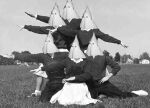Lynch mob

A lynch mob is a distinctly American addition to the field of crime and punishment. When the wheels of justice start squeaking and sticking, the uniquely democratic nature of American society prompts citizens to help their government and administer criminal penalties themselves.
Some scientists regard the lynch mob as a separate life form, with the biological classification possum comitatus.
History[edit]
Lynch mobs began in the Southern United States because Negroes were profitably kept as farm hands and thus the justice systems of the states were slow to punish for crimes such as "Picking Cotton While Black." Townspeople took the work of punishment onto their own shoulders, as well as the Negro in question.
Ordinary townspeople did not have electric chairs, or least of all the three-injection sequence that the U.S. Supreme Court requires to ensure against cruel and unusual punishment. Thus, they used the implements at hand, which always included a length of sturdy rope.
Fellow Colonial Virginians Charles Lynch (1736–1796) and William Lynch (1742–1820) claim credit for coining the term. Whoever deserves actual credit is more ensconced in American English than anyone apart from Mr. Crapper. In Ireland, James Lynch Fitzstephen of Galway had a similar claim, and could point to the time he hanged his own son as credence. However, linguistic evidence is against it, as his son's tongue was not even hanging out after the stunt.
United States[edit]
After the Civil War, whites struggled to maintain social dominance, or pwnage. Secret vigilante groups such as the Ku Klux Klan attacked Negroes, Northerners, teachers, and County Extension agents with tips on when to plant crops.
From the 1890s onwards, African Americans were most commonly lynched, but lynch mobs went after Mexicans and Chinese. However, they always seemed to spare Norwegians.
The lynch mob has been called domestic terrorism. The historial William Gillette labeled it guerrilla warfare and it led him to develop the safety razor and the football stadium near Boston as less grueling implements of torture.
Notable Lynch mobs[edit]
- In New Hampshire, whose motto for decades had been the inspiring words of Tony Stark, "Live Free or Die," Governor John Lynch began erecting signs at the state line that instead read, "Cheap Liquor * Sweeps Tickets". A mob bearing his name approached Concord to insist that the change was a prelude to a new statewide tax. The Governor relented and promised to put the old signs back up, provided rich businessmen paid to have it done.
- In the years of President Obama, first-ever black Attorney General Eric Holder, who happened to be anti-police, decided to leave through the revolving door of government service. His replacement was first-ever black-and-female Attorney General Loretta Lynch, who also happened to be anti-police. The opposition Republican Party took time out from "reaching across the aisle" to hold up Lynch's nomination for five months, to get more money for Boeing or GE or whatever. Thus, mobs had to be set up around the U.S.A., wherever a white policeman shot a black pedestrian. These were all technically "Lynch mobs," as they showed the need for a black female Attorney General with a large chip on her shoulder regarding police, and no chip on her shoulder at all regarding black-on-black shootings in the inner city.
